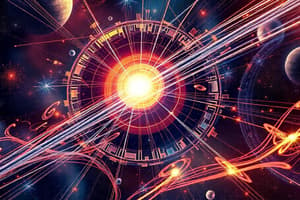Podcast
Questions and Answers
What branch of physics is concerned with the study of light, its properties, and behavior?
What branch of physics is concerned with the study of light, its properties, and behavior?
- Thermodynamics
- Quantum Mechanics
- Electromagnetism
- Optics (correct)
What is the term for the rate of change of velocity?
What is the term for the rate of change of velocity?
- Motion
- Acceleration (correct)
- Displacement
- Velocity
According to Newton's Laws, what is the relationship between force and acceleration? new
According to Newton's Laws, what is the relationship between force and acceleration? new
- Force is inversely proportional to acceleration
- Force is proportional to acceleration (correct)
- Force is proportional to velocity
- Force is constant regardless of acceleration
Flashcards are hidden until you start studying
Study Notes
Branches of Physics
- Mechanics: Study of motion, forces, and energy.
- Thermodynamics: Study of heat, temperature, and energy transfer.
- Electromagnetism: Study of electricity, magnetism, and electromagnetic waves.
- Optics: Study of light, its properties, and behavior.
- Quantum Mechanics: Study of the behavior of matter and energy at the atomic and subatomic level.
- Relativity: Study of the nature of space and time.
Key Concepts
- Motion:
- Displacement: change in position
- Velocity: rate of change of displacement
- Acceleration: rate of change of velocity
- Forces:
- Gravity: force of attraction between objects
- Friction: force opposing motion
- Normal force: force exerted by a surface
- Energy:
- Kinetic energy: energy of motion
- Potential energy: energy of position or state
- Conservation of energy: energy cannot be created or destroyed, only converted
Laws of Physics
- Newton's Laws:
- Inertia: an object at rest remains at rest, an object in motion remains in motion
- Force and acceleration: force is proportional to acceleration
- Action and reaction: every action has an equal and opposite reaction
- Einstein's Theory of Relativity:
- Time dilation: time appears to pass slower for an observer in motion
- Length contraction: objects appear shorter for an observer in motion
- Equivalence of energy and mass: E=mc^2
Important Physicists
- Isaac Newton: developed laws of motion and universal gravitation
- Albert Einstein: developed theory of relativity and famous equation E=mc^2
- Marie Curie: discovered radioactive elements and pioneered radioactivity research
- Galileo Galilei: made key contributions to the study of motion and inertia
Studying That Suits You
Use AI to generate personalized quizzes and flashcards to suit your learning preferences.




